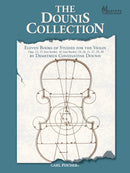| 作曲者 | Demetrius Constantine Dounis (ca. 1886/1894-1954)・ドゥニス |
| タイトル | The Dounis Collection: Eleven Books of Studies for the Violin |
| サブタイトル | Opp. 12, 15 (two books), 16 (two books), 18, 20, 21, 27, 29, 30 |
| 出版社 | Carl Fischer Music・カール・フィッシャー |
| 楽器編成 | Violin |
| 品番 | CFBF16 |
| 形状 | 22.9 x 30.5 cm |
| 出版年 | 2005年 |
| 出版番号 | BF16 |
| ISBN | 978-0825858505 |
Demetrius Constantine Dounis (1886–1954) was one of the most
prominent violin pedagogues of the twentieth century. Dounis’ work in
violin pedagogy extended to many areas, but there are two specific areas
for which he was highly revered and influential in his own time and
today. The first was his intense concern with the proper ergonomics of
violin playing, for example, the horizontal and vertical movements of the
left hand, the importance of muscular development and relaxation, the
development of finger strength and independence in the left hand, and the
proper means for gripping the bow in the right hand. The second area is
his emphasis on the role of the brain, not the arms or the fingers, in proper
violin practicing and playing.
The eleven books in this collection are the most comprehensive
collection of this master pedagogue’s work ever published.
Foreword, "The Artist's Technique of Violin Playing, Op. 12", "The Absolute Independence of the Fingers In Violin Playing on a Scientific Basis, Op. 15", "The Absolute Independence of the Fingers In Violin Playing on a Scientific Basis, Op. 15", "Preparatory Studies In Thirds and Fingered Octaves on a Scientific Basis, Op. 16", "Preparatory Studies In Thirds and Fingered Octaves on a Scientific Basis, Op. 16", "Fundamental Trill Studies On a Scientific Basis, Op. 18", The Violin Player's Daily Dozen, The Staccato:, "New Aids to the Technical Development of the Violinist, Op. 27", "Studies in Chromatic Double-Stops for the Violin, Op. 29", The Higher Development of Thirds and Fingered Octaves



